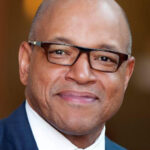Op-Ed: I’m President Of Morehouse College. Here’s My Advice To Protesters.
Op-Ed Letter To The Editor
Submitted by: Dr. David A. Thomas – President, Morehouse College
When I was 12 years old, I could smell Kansas City burning from my backyard. Neighbors angered by the assassination of Martin Luther King Jr. marched with their fists in the air. Their show of unity was met with tear gas. Soon, shops were set ablaze.
Back then, the fight was to be valued and respected as contributing citizens; to bring attention to discriminatory practices in voting, education, housing, health care and employment; and to stop the violence blacks had suffered for generations at the hands of police sworn to serve and protect them.
Today, protesters lift their voices to expose the institutionalized racism that has worked against minorities in the United States for far too long. Their cries for justice have echoed across the world. Yet they, and our society more broadly, still have much to accomplish.
To understand the struggle, and our pain, some had to be shocked into acknowledgment. They had to hear the sobs of Rayshard Brooks’s widow after her husband was shot in the back, twice, by Atlanta police, and kicked as he lay on the ground. They had to see footage of a Minneapolis cop digging his knee into George Floyd’s neck for nearly nine minutes.
They had to see the terror of two Morehouse and Spelman College students at being yanked from their car, Tasered and dragged across broken glass. The global pandemic had provided statistics: Blacks are twice as likely to die from covid-19 and the rate of black workers affected by the novel coronavirus is greater than for whites. But these police actions and other events lent visible context to our frustration.
Now, the declaration that black lives matter is understood widely without immediately summoning uneasiness or contempt. Black Lives Matter was never an attack; it was about saving lives and reclaiming our narrative.
Americans live in a racial paradox where a black man can be elected president and still be pulled over for driving while black, or followed closely in stores. At Morehouse College, our mission is to educate and develop men to be scholars and leaders. We believe that black male excellence should be an expectation, not an exception. Where would our country be if everyone heeded the call of Morehouse alumnus Martin Luther King Jr. to judge people not by the color of their skin but by the content of their character?
Through peaceful protest, diverse voices of the anti-racism movement are asking for what their fathers before them asked. They want solidarity to bring about change. They want equal justice under the law. They want to reimagine community policing; to reform the educational system so it is equitable and excellent for all students; and to develop policy strategies that bring jobs, investment, revitalized housing, and, ultimately, hope into low-income neighborhoods.
Surely, more Americans can now empathize with this plight. The vast unemployment of the pandemic revealed the reality of life on the margins, where many black and brown families have long dwelled, struggling to pay rent, buy food,- and afford medication. Blacks rank last in household income, just below Hispanic families, according to census data. While the U.S. unemployment rate dropped to 13.3 percent in May, unemployment among blacks rose to 16.8 percent.
Centuries of economic deprivation cannot be fixed overnight. But protesters’ tenacity is tearing down blue walls. Officers who fail their communities by using deadly force unnecessarily are facing consequences that include immediate termination and criminal charges. More cities are rethinking policing. In Atlanta, where the police chief has resigned, the officer who fatally shot Brooks has been fired and charged with felony murder. The six officers who pulled over the Morehouse and Spelman College students face charges including aggravated assault and criminal damage to property. Four were fired.
But legal battles limp along. The energy and determination of young people will be critical to this movement, much as it was when the footsteps, arrests, and bloodshed of Dr. King and the Student Nonviolent Coordinating Committee members led to the Civil Rights Act of 1964, ending segregation in public places and banning discrimination in employment.
As the father of a daughter and two sons — and caretaker to 2,200 more at Morehouse — I worry about their safety when they leave to mobilize their peers in peaceful protest. I know that their power lies in having a strong voice and an even stronger commitment to the tools of nonviolence, and patience, as they seek to transform this country into the America it should be. Marching recently with my sons, I felt encouraged that black and brown children entering K-12 classrooms would benefit. New anti-racists would be slower to judge their abilities to achieve greatness.
My advice to young protesters: Use the vote to speak volumes. Demonstrate excellence in your profession or vocation; greatness brings authority to speak and effect change. Use your success to advance the causes of equity and equality.
Do not forget who, and whose, you are. Never give up, even though your footsteps may wear out your sneakers and pepper-sprayed tears sting your cheeks. March on with the blessings of the elders to watch over you.

Dr. David A. Thomas
President, Morehouse College


